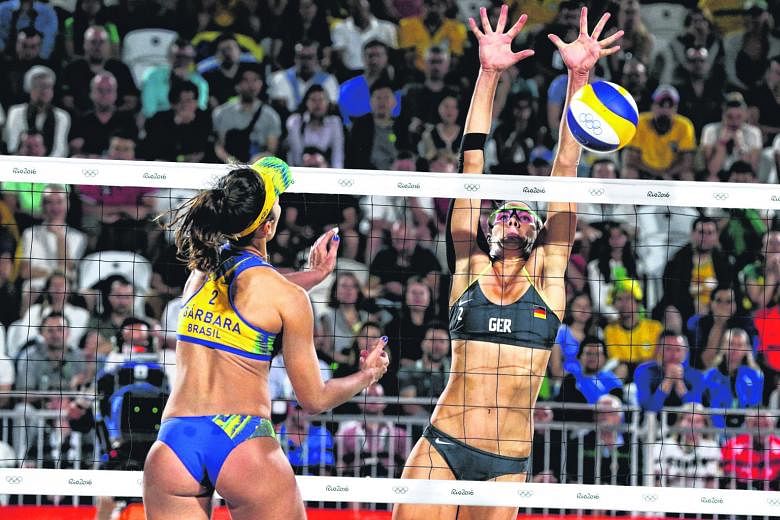Beach volleyball might be fun in the sun everywhere else but this is Rio. This is mayhem by moonlight. This is sandy dogfights at midnight. This is a black sea as a backdrop and stands which rise high into the night like steel monsters from Transformers. Copacabana is a New York nightclub where scenes from Raging Bull were filmed, but this is Copacabana beach where the only violence is committed on a ball by Olympic hippies.
These athletes are barefoot, drip cool, are known by first names and are almost unanimously anti-clothing. This is women's finals night and a samba band loiters in the corner, the DJ never stops, ushers sway in the aisles and it seems illegal not to dance. No medal should be so much fun. It is an atmosphere which would rattle meditating shooters and make equestrian competitors look at their boots, coats, top hats and wonder if they might be a tad over-dressed for sport.
Fittingly it's around midnight that Six Feet of Sunshine arrives in the mixed zone. Six Feet of Sunshine is a phenomenon which blows into various towns every Olympic year. Six Feet of Sunshine has one never-ending smile, three children and now a fourth medal in four Olympics. In 2004, 2008, 2012 they were gold, on this night it is bronze, and Kerri Walsh Jennings, aka Six Feet of Sunshine, couldn't be happier.
This is why you should go to the beach volleyball at a Games. Or equestrian. Or rowing. To discover a world beyond Bolt and Biles. To recognise greatness in all its sporting forms. To hang a bit with legends who don't get sufficient respect outside their borders.
Like Japanese wrestler Kaori Icho who wins four consecutive Olympic golds and says "I didn't wrestle very well". Like rowers Hamish Bond and Eric Murray, who have won a second successive Olympic gold and 69 straight rowing races. Like Charlotte Dujardin, who wins a third equestrian gold in two Games and is so driven by her sport that her fiance wears a shirt in Rio which reads: "Can we get married now?"
These are all competitive cousins of Walsh Jennings, these are the unendingly, unflinchingly, unabashedly ambitious. People go and on about patriotism and medals but winning is not about the flag, it is first about inner fibre. It's about answering the call of your nagging inner self which no one can hear.
And Six Feet of Sunshine hears this call. She always has. So does her partner who is named April Ross. But of course. Walsh Jennings hasn't lost in three Games and then she loses in the semis a few days ago to a Brazilian pair. "Devastated is a big word but we were devastated," she said.
Walsh Jennings has three golds because she wasn't satisfied with bronze; but she hasn't won gold here and so she's going to scrap forever for bronze. She tells herself: "Stop feeling sorry for yourself, it is an honour and a huge challenge to come and fight for this." Bronze, she and April know, is the last chance and the toughest fight; bronze is the match between something to take home and nothing.
For the bronze they play another Brazilian pair, Larissa Franca Maestrini and Talita Rocha. The Brazilian duo lead the Americans, the Brazilian fans jeer the Americans. Booing beach volleyball players could be the least hip thing to do in sporting history. When asked about it, three local journalists shrug and say that booing in football among clubs is a fundamental right here and so it's just part of their culture that's drifted with the wind to other venues.
What to do? You shrug back.
Players secretively signal serving directions from behind their back like tennis players and then slam down serves at 64kmh. Sand blows, plastic bags fly and so do they. They fall from six feet and rebound athletically like gymnasts whose skin is made of rubber. Every now and then, like at the French Open, men with brooms will come and rake the surface. But Walsh Jennings' footprints aren't so easily erased.
She's down a game but you don't get to legend by falling over. Later, in the mixed zone, Brazil's Rocha will say not once but twice: "She never gives up." The Americans win the second game, then the third and then can't stop hugging. In 1948, the winner of a beach volleyball tournament got a crate of Pepsi. These women will prefer their bronze.
In the mixed zone, Walsh Jennings is all charm. This game defines her and she'll spread its gospel to anyone who wants to listen. As she leaves we chat briefly and I ask where she keeps her medals. Silly question. She's Six Feet of Sunshine. Where else but in her Oakley sunglasses case in her closet.


